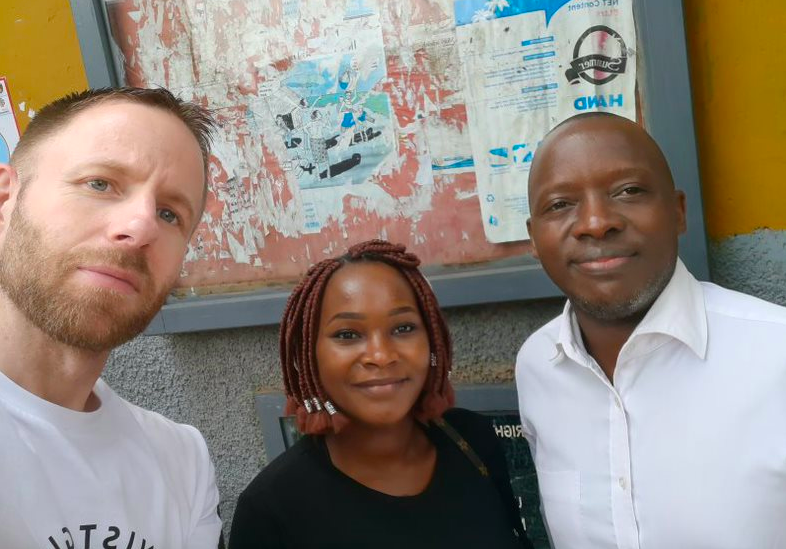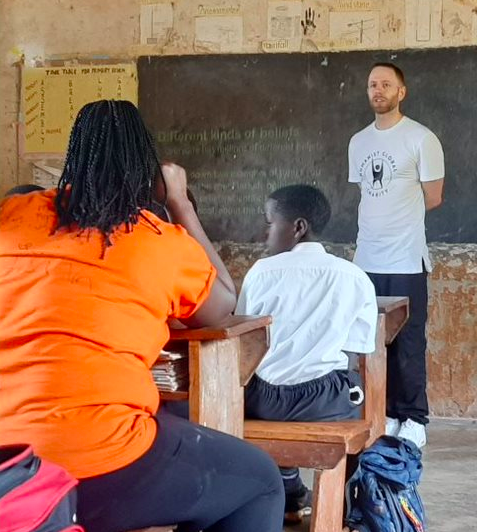Critical Thinking Report 13-18 February 2022, from Uganda
by Dan Beaton
Critical Thinking Workshop 1: Ssekezza Primary School The first CT workshop took place at Ssekezza Primary School near Mpigi. Roughly 30 children attended and appeared to be around 12 years old. Learners in this group were below the target age for our designed curriculum and many had problems understanding English (or at least my accent). Assistance was provided by the head teacher: She was very cooperative and clearly explained points in the local language.
Some unusual beliefs that were questioned included the illuminati and the existence of mermaids
Critical Thinking Workshop 1: St Lawrence Crown City
The second workshop took place in St Lawrence Crown City with around 45 learners. Unfortunately, the cohort of learners appeared to be again below my target age of 14+. Given the difficulty in securing age-appropriate cohorts, it is essential to develop a workshop for younger learners.
Some of the beliefs questioned included:
• ritual sacrifice in which an uncircumcised child of five years is taken to a witch doctor (referred to as a ‘jjaja’) to be sacrificed for riches
• a compound fracture can be healed through a voodoo style ritual involving breaking a chicken’s leg then putting it back together causing the human bone to heal
• a Jjaja can control the weather and stop the rain through a fire and spear ritual
There was some confusion as to whether identifying a justification for a belief is sufficient to show it is false (it is not) and many students and teachers it seems almost wanted a straightforward trouble shooting method for judging beliefs. I revised some of the resources in response to confusions like these.
David Oloo secured these two schools and helped deliver a session. David has an interest in delivering further workshops and is an experienced teacher with access to regions outside of Kampala.
Critical Thinking Workshop 3: Kampala Student Centre
The next workshop was held in Kampala. The school was the former school of Mukasa Kato author of The God Business and the Death of Reason in Africa. The school caters to students from a poor background yet has a distinguished alumni. The school however has been hard hit by two years of lockdown and torrential rain, leaving it in a state of disrepair and only a small student cohort. They are desperately seeking funding. This workshop was delivered to 12 students and four members of staff
Kato was impressed by the even-handed and non-confrontational nature of the workshop. However, after the session I realised students often got confused with evaluating justifications for beliefs. For example, one student evaluated science simply as a technological enterprise (for example citing the problem that smart phones make us antisocial), instead of seeing how poor science reporting and poor quality studies can lead us to false beliefs.
Critical Thinking Workshop 4: Bright Way Hill School (Kampala)
The final workshop was the most successful, delivered to the whole student body of a larger secondary school. Though my projector did not work, the students were engaged and curious.
Beliefs that were critical examined included:
• Europeans cannot contract HIV
• Covid-19 was created to reduce the black population
• the Illuminati exists as devil worshippers and engage in blood sacrifice for fortunes –this is proved by Lil Naz marketing stunts involving alleged human blood shoes
• wanting something to be true makes it true (to be distinguished from positive thinking as a motivator to action)
• faith is persuasive reason to believe to those who lack that particular faith
Other general discussions included:
• the post hoc ergo propter hoc fallacy and its role in supporting supernatural beliefs, including spontaneous remission of disease and the placebo effect – how they trick us into inferring false causation
• extraordinary claims require extraordinary evidence - using the example of time travel as a comparison point for more common beliefs
• presenting evidentialism - what evidence for miracle healing would be sufficient to demonstrate a claim
Training Session
Viola Namyalo of Ugandan Humanist Association has a background in sexual health education. We reviewed resources and stationery was also delivered. Though the slides are a great guide for educators to then splice with their own superior local knowledge, using a projector isn’t practical as the only projector owned by the organisation is now in Nigeria. Valuable resources to bring in the future would therefore include large chalks and a portable white or black board. More pens and paper and worksheets would encourage more active participation for learner who, in an African schooling context shaped by an outdated colonial model, often just sit and passively listen.



